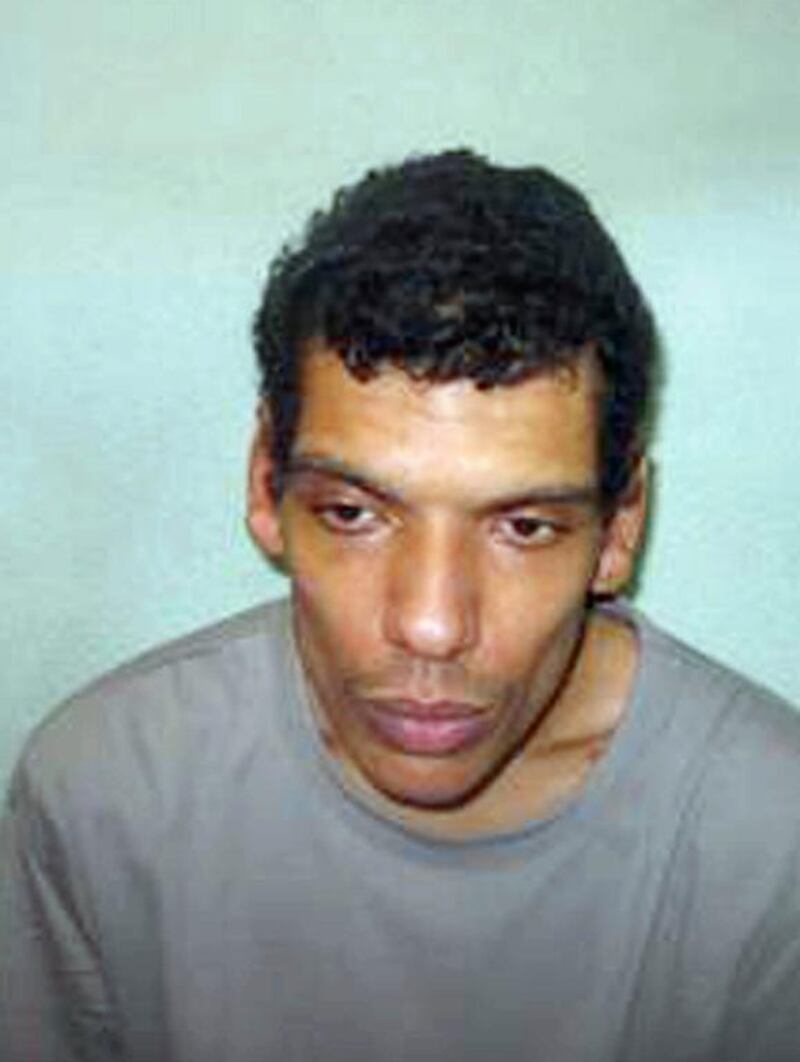LONDON // A maniac who left three Emirati sisters for dead in a horrific claw hammer attack at a luxury hotel had an extra nine years added to his 18-year sentence on Thursday.
Philip Spence, 33, bludgeoned his victims in front of their terrified children at their suite in central London's Cumberland Hotel on April 6 last year.
Khuloud Al Najjar, 36, and her sisters Ohoud, 34, and Fatima, 31, from Sharjah, suffered smashed skulls and life-threatening injuries in the bloodbath.
Spence was given a life sentence for the three counts of attempted murder and ordered to serve a minimum of 18 years before he was eligible for parole, after a trial at Southwark Crown Court.
But on Thursday he stared blankly ahead as the solicitor general, Robert Buckland QC MP, argued the sentence was “unduly lenient” and Spence deserved a whole-life term.
He said Spence should be treated like a murderer, because it was only due to advances in modern medicine that all three sisters had survived, and their debilitating injuries could be considered “equal or worse than” death.
Mr Buckland said in this case “a whole-life order is merited, [even] in the absence of a conviction for murder”.
Spence still displays “little insight” and “does not accept murderous intent”, experts reported.
“He was known to carry a hammer and he was using a hammer as a defensive weapon as long ago as 2008,” Mr Buckland said. “At some time during or after the attack he was sufficiently calculated to complete the burglary.
“He also had the presence of mind to dispose of the hammer.”
Spence brutally pounded Ohoud’s head with the hammer, destroying the left side of her skull and leaving her with just 5 per cent brain function. Khuloud and Fatima both suffered fractures to the skull and defensive injuries where they desperately fought against Spence’s onslaught.
Khuloud’s two daughters, aged 11 and 7, were also in the room. Ohoud and Khuloud’s nine-year-old son were asleep in the room next door.
Mr Buckland called the crime “a cold-blooded attempt to kill every adult present” and an act of “premeditated wickedness”.
He concluded: “The appropriate sentence in this case is a whole-life tariff.”
William Nash, Spence’s solicitor, said: “It is an extremely rare event for a whole-life tariff to be imposed for something that doesn’t result in an actual murder.”
Mr Nash said he had “no doubt he [Spence] would have been entirely content if he had never had to use it [the hammer]”.
The solicitor also said Spence had not regularly carried around a hammer as a weapon, as alleged.
The Lord Chief Justice, Lord Thomas, sitting with Mr Justice Globe and Mr Justice Knowles, refused to pass a whole-life tariff, instead increasing Spence’s minimum term to 27 years.
“A very serious aggravating feature in this case was that this murderous attack was carried out in front of Khuloud’s children,” he said. “Having left the women for dead, the defendant collected a suitcase full of valuables.
“All three sisters who were attacked suffered life-threatening injuries. The effect on the children has inevitably been severe. They no longer trust anyone, fear to be alone and don’t want to leave home.”
Lord Thomas agreed that thanks to “modern medical science”, victims of violent attacks can have “miraculous recoveries”.
He added: “This is a shocking case. However, it seems to us, looking at what this court has said on a number of occasions, and taking into account all the facts, that this is not a case where a whole-life tariff would be the right sentence.
“However, we are firmly of the view and we have no hesitation whatsoever that the minimum term imposed by the judge was unduly lenient.
“In our judgment, the minimum terms should therefore be one of 27 years and we therefore quash the original order and impose in its place a minimum term of 27 years, less time on remand.
“It will be for the parole board with due care to consider whether this offender, who is obviously highly dangerous, will be, if ever, released.”
Spence had been smoking crack for two days when he spotted that one of the room doors on the seventh floor of the hotel was partially open.
After the attack he strolled out of the hotel with a suitcase stuffed with valuables including a white diamond-encrusted Cartier watch worth £12,000 (Dh68,936) and Louis Vuitton jewellery.
Spence had an appalling criminal record for burglary and violence, with 37 convictions for 62 offences.
Spence, of Alperton, north-west London, admitted three counts of causing grievous bodily harm with intent and one count of aggravated burglary. He denied three counts of attempted murder and one count of conspiracy to commit aggravated burglary but was convicted of those charges.
Neofitos “Thomas” Efremi, who conspired with Spence and supplied the hammer, was jailed for 14 years for conspiracy to commit aggravated burglary and two years and three months for fraud, the sentences to run concurrently.
James Moss, who admitted handling stolen goods, was given a 21 month sentence suspended for two years. He is also subject to a four-month curfew and will be electronically tagged and monitored between 8pm and 6am.
newsdesk@thenational.ae






